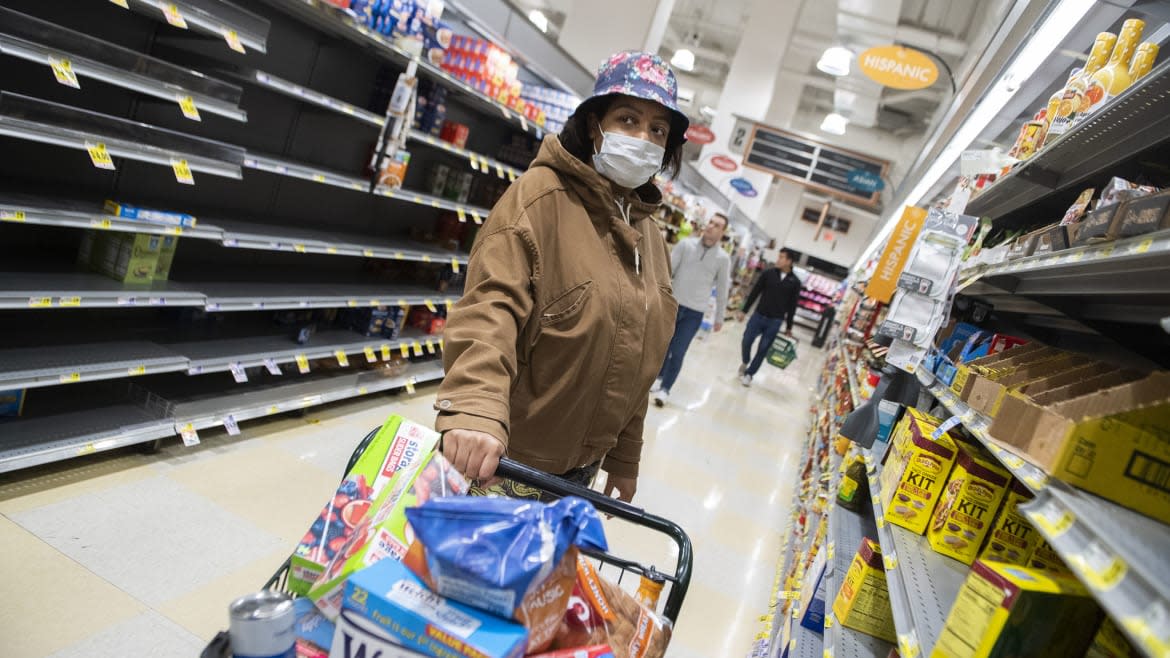Will the U.S. Run Out of Groceries Under Lockdown?

A popular meme describing the monotonous routine of coronavirus-induced home-stays repeats Dolly Parton’s “9 to 5” intro: “Tumble out of bed and I stumble to the kitchen... tumble out of bed and I stumble to the kitchen... tumble out of bed and I stumble to the kitchen.”
Food is on American minds as tens of millions coop up at home to prevent the spread of COVID-19. Restaurants are closed except for takeout. Grocery stores, deemed essential businesses, are open, but empty shelves show evidence of panic buying across the country. News outlets have compiled lists of which stores are open and their operating hours, clarifying and reinforcing a fundamental concern: Will grocery stores close because of the coronavirus pandemic?
More existentially terrifying, perhaps: Will the food supply chain break down entirely?
It's Every State for Itself Now in Pandemic Panic
Some stores have begun closing, despite being essential businesses. Trader Joe’s at least temporarily shuttered some stores after staffers tested positive for the coronavirus. Supermarket clerks have begun to succumb to the virus in Italy, and U.S. stores have taken to installing protective barriers between shoppers and cashiers. Entire governments have also hoarded food: Kazakhstan banned the international sale of wheat flour, of which it is one of the world’s largest exporters, and Serbia has instituted similar measures.
Meanwhile, as ProPublica reported Saturday, there have been disturbing signs of meat-industry workers feeling pressured to stay on the job despite illness, and a food safety inspector in New York recently succumbed to coronavirus.
But at least for now, panicked shoppers and bare shelves speak less to a lack of food than shifting demand and lagging logistics, experts told The Daily Beast. Restaurants needed far less food as they closed; individual people and families decided they needed far more as they faced weeks at home. Food inventory is actually high, according to government data.
The empty shelves are largely a matter of moving it.
“It’s a several-weeks process. The supply chain takes time to catch up,” said Professor Yossi Sheffi, director of the MIT Center for Transportation and Logistics.
Even in Wuhan, China, where the pandemic began, residents faced only localized food scarcity at the peak of COVID’s rage there. And couriers delivered food and other supplies even as it faced a concerted lockdown.
In a lighthearted sign that shortages are nowhere near disaster-level, American shoppers still have the choice to leave behind whole shelves of plant-based hot dogs and other perhaps less desirable items even as they pick staples clean.
“The timestamp of a picture like that is always in the evening. Overnight, it will be restocked,” Sheffi said. “You may not get your favorite cereal, but you’ll get cereal.”
His take echoed assurances from government officials.
“There are currently no nationwide shortages of food, despite localized reports of shortages,” Deputy FDA Commissioner Frank Yiannas wrote in guidelines published Tuesday. “Food production and manufacturing—for both people and animals—are dispersed throughout the U.S. and there are currently no widespread disruptions reported in the supply chain.”
Sheffi said he’s focusing his attention more on the medical supply chain. A dire shortage of protective equipment has led health-care workers to be exposed and become sick in droves, and he’s advising hospitals and companies on the best ways to manage inventory.
“Food is not a problem because it’s made in the US. It’s a question of getting it where it needs to go,” he said.
He added that there are measures grocery stores can take to safeguard customers and employees: making aisles one-way, erecting signs encouraging physical distancing, or even placing groceries into the trunks of customers’ waiting cars.
“I don’t see a situation where stores will be bare,” Sheffi said. “Prices may go up, but the situation will cure itself naturally. Before grocery stores close, we’re going to lose all the hospitals.”
Got a tip? Send it to The Daily Beast here
Get our top stories in your inbox every day. Sign up now!
Daily Beast Membership: Beast Inside goes deeper on the stories that matter to you. Learn more.


